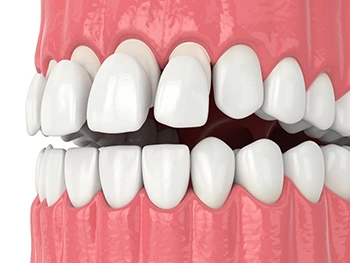First impressions are everything- and your smile can make or break an interaction with someone else. Research shows that 68% of Americans believe that people who smile are more approachable, confident, and trustworthy. Unfortunately, research also shows that approximately 40% of people do not smile big because they are ashamed of their smile.
If you are among this group of people, you may benefit from cosmetic dental procedures such as dental veneers. This is a common procedure, making up approximately 1/4 of cosmetic procedures performed annually. Typically, veneers are placed on the upper front 6 to 8 teeth that are visible when smiling. They are rarely placed on molars or premolars.
Clarksburg Dental Center in Germantown offers a variety of dental services for the entire family. One of our most popular cosmetic procedures is dental veneers. In this article, we’ll explain more about this procedure and what you can expect before, during, and after.
 Dental veneers are thin shells placed on the front of a tooth to improve the appearance and create a flawless smile. There are several reasons that patients choose veneers over other cosmetic procedures, including:
Dental veneers are thin shells placed on the front of a tooth to improve the appearance and create a flawless smile. There are several reasons that patients choose veneers over other cosmetic procedures, including:
Veneers are typically not used on teeth that have been treated with root canal therapy. In most cases, a dental crown or onlay is recommended for these teeth to protect them.
There are several types of dental veneers on the market, which means you should be able to find one to fit your needs and budget.
Porcelain veneers are thin caps that are designed to be placed on damaged teeth to restore their appearance. This type of veneer is typically made in a dental lab, though some clinics do have the ability to make them in-house. Porcelain veneers typically last 20 years or more with proper care and maintenance.
The dentist will start by removing some of the enamel to create space for the veneers and then create an impression or 3D image of your teeth for the creation of your veneers. If the veneers must be fabricated in an off-site lab, temporary veneers may be placed to protect the teeth while you wait.
When the veneers are ready, the dentist will cement them in place and then place a light over your mouth to harden the cement. Porcelain veneers are durable, stain-resistant, and long-lasting. The biggest disadvantage is that if a porcelain veneer is damaged, it must be replaced- repair is not possible.
Composite veneers are made from the same material that tooth-colored dental fillings are made of. These can be direct (applied directly to the teeth) or indirect (fabricated outside of the mouth). This type of veneer requires less enamel removal and can usually be completed in a single appointment.
The dentist will start by removing a thin layer of enamel and then applying composite resin to the tooth. You may need several layers to achieve the desired look. Once the application process is complete, the dentist will place a special light over your head designed to harden the resin.
Composite veneers are less expensive and less durable than porcelain. However, if composite veneers are damaged, they can be repaired instead of replaced.
Temporary veneers are designed to be worn and removed. There is no tooth prep required for temporary veneers. These may be pre-fabricated or custom-made and typically cost about $300 for a custom, full arch.
According to the American Dental Association, the cost of dental veneers depends on several factors, including:
Unfortunately, since this is a cosmetic procedure, most dental insurance providers will not cover any part of it. However, you may be able to reduce your cost by going to a dental clinic where the cost of living is lower or going to a dental school where the work is done by students but supervised by dentists.
Temporary veneers are the least expensive. You can get a full custom-made arch for around $300. However, these can only be worn for short periods of time. This is not designed to be a long-term solution.
Porcelain veneers are the most expensive because they appear more natural than composite resin. Porcelain veneers range from $925 to $2,500 per tooth. They are long-lasting and stain-resistant. However, they are susceptible to chipping and/or fracturing. If this happens, the damaged veneers must be replaced.
Composite veneers range from $400 to $2,000 per tooth. Typically, these last between 5 and 7 years, but may last 10 years or more with proper care and maintenance. They are more likely to be damaged and do not resist staining as well as porcelain. However, if they are damaged, they are easy to repair.
 The preparation process starts with removing some of the enamel. This creates space for the veneers to sit on the teeth and blend with the surrounding teeth. Porcelain veneers require more enamel removal than composite.
The preparation process starts with removing some of the enamel. This creates space for the veneers to sit on the teeth and blend with the surrounding teeth. Porcelain veneers require more enamel removal than composite.
Typically, porcelain veneers are fabricated in an off-site dental lab. If this is the case, the dentist will usually place temporary veneers on your teeth while you wait. Composite can be applied directly to teeth, so there is no waiting.
There are a few risks associated with dental veneers, including:
However, the dentists at Clarksburg Dental Center are aware of these risks and will take steps to reduce your chances of experiencing them.
Most people are unhappy with their smile and, given the opportunity, will do what they can to improve it. Dental veneers offer that opportunity to do just that. In fact, veneers are one of the most common components of the “Hollywood Smile” or “smile makeover” that many dental clinics offer. Dental veneers are such a popular cosmetic procedure that you don’t have to look very far to find a celebrity with veneers.
Both dental veneers and dental crowns are restorative dental procedures. However, there are a few things you should know about each of them:
| Dental Veneers | Dental Crowns | |
| Placement | Primarily used on upper 6 to 8 front teeth | Can be used on the front or back teeth |
| Purpose | Restores appearance and some functionality | Primarily restores functionality and some appearance |
| Cost | Ranges from $300 for removable, temporary veneers to $2,500 for porcelain veneers. Dental insurance typically does not cover the procedure | Ranges from $900 to $3,500 depending on several factors including the location of the tooth, type of crown, and more. Dental insurance will typically cover a portion of treatment. |
| Type of Procedure | Cosmetic | Restorative |
| Timeline | Composite veneers can be done in one appointment, porcelain usually requires at least 2 | Can typically be done in 2 appointments, depending on the additional procedures required |
Placement
Dental Veneers
Primarily used on upper 6 to 8 front teeth
Dental Crowns
Can be used on the front or back teeth
Purpose
Dental Veneers
Restores appearance and some functionality
Dental Crowns
Primarily restores functionality and some appearance
Cost
Dental Veneers
Ranges from $300 for removable, temporary veneers to $2,500 for porcelain veneers. Dental insurance typically does not cover the procedure
Dental Crowns
Ranges from $900 to $3,500 depending on several factors including the location of the tooth, type of crown, and more.
Dental insurance will typically cover a portion of treatment.
Timeline
Dental Veneers
Composite veneers can be done in one appointment, porcelain usually requires at least 2
Dental Crowns
Can typically be done in 2 appointments, depending on the additional procedures required
If you are interested in transforming your smile with cosmetic dental procedures such as dental veneers, schedule your consultation with the team at Clarksburg Dental Center today.
We will start by performing a comprehensive exam and cleaning to determine your candidacy for dental veneers. We will also discuss your expectations for treatment. If it is determined that you do qualify for veneers, we will move forward with the procedure. If we decide that another option is better, we will help you learn more about your options.
Our dental team takes a patient-centered approach to dental care and will work with you to ensure that you are comfortable during your visit. We strive to implement the latest in dental technology to increase your comfort and improve your results.
We are located at 19785 Crystal Rock Drive, Suite 211 in Germantown. Our office hours are Monday through Thursday from 7:00 AM to 7:00 PM. You can schedule your appointment by calling the office at (301) 245-2217.
If you ever have any questions or concerns at all regarding your treatment at Clarksburg Dental Center, we will be happy to address those with you. We believe that patients should understand their procedures, not just blindly trust us. Below are some of the most common questions we get about dental veneers.
Veneers range from around $300 for a temporary, removable full arch veneer. Composite veneers start at around $400 per tooth and porcelain veneers start at around $925 per tooth. Dental insurance typically does not cover treatment.
On average, dental veneers have been shown to last 5 to 20 years or more. This depends on several factors including the type of dental veneers you have and how well you care for and maintain them. You can make them last longer with proper oral care habits and visiting the dentist every 6 months.
Due to the fact that some enamel is removed from the teeth to create space for the veneers, this is a permanent, irreversible procedure. Once you have veneers, you will not be able to have them removed in the future. Therefore, this is a serious decision requiring much thought and attention.
Veneers are applied to the front surface of the teeth to disguise any imperfections such as gaps, cracks/chips, discoloration, and more. The dentist will remove a portion of the enamel to create space for the veneers to be attached to the teeth, making this a permanent solution.
Dental veneers do not hurt. We will administer local anesthesia to numb the area while we are removing the enamel, so you may have some discomfort as the anesthesia wears off. However, you should never have pain during or after this procedure. If you do, an underlying issue may need to be resolved.
While veneers are expensive, this cosmetic dental solution can change your entire appearance, which can boost your confidence and improve your life. Research shows that approximately 76% of people believe that first impressions start with your smile. When you have an aesthetically-pleasing, healthy smile, it shows. If you’ve been hiding your smile due to imperfections, you might want to consider veneers. You may find that they are well worth the investment.